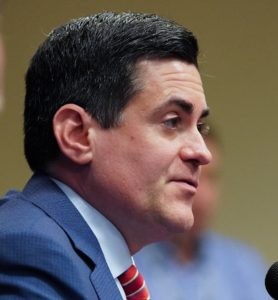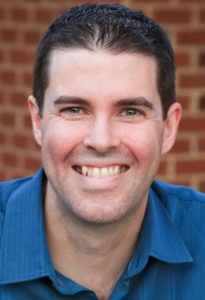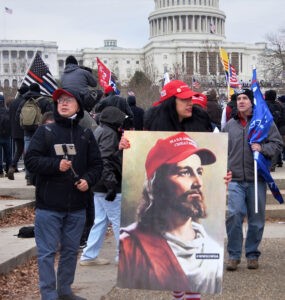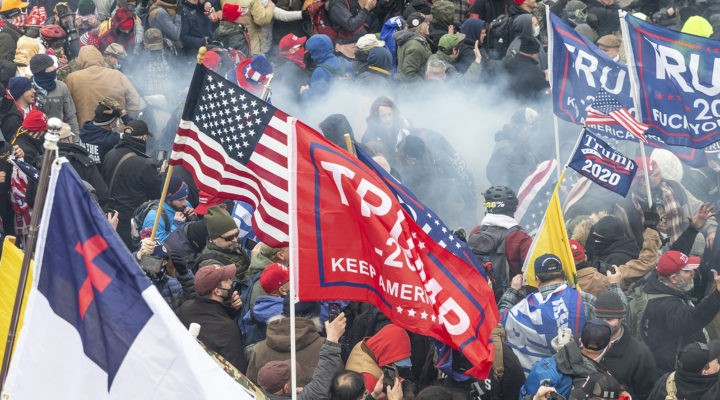Brandon Long wanted the doctrine of “redemption” to be the hill he would die on. Instead, the doctrine of evangelical loyalty to Donald Trump was his demise as a pastor.
In 2018, Long and his wife experienced a divine call to move to Cincinnati to start a church in conjunction with the Southern Baptist Convention’s North American Mission Board. They launched the new church’s core group in 2019.
During this year of preparation, Long cast a vision for what he wanted the culture of the church to be. After some time, the group settled on the name Redemption Hill Church. Long explained the reason: “We wanted redemption to be the hill that we would die on.”

Brandon Long
Redemption Hill Church launched in August 2020. It was a vibrant and growing church plant Long described as “diverse ethnically and politically.”
Early on, Long preached a sermon series on the Apostles’ Creed. His intent was to make sure the congregation understood its initial vision to keep loyalty to Jesus as the center of the church.
“And then November came,” Long lamented. “There was a crack that came into our foundation.”
Parishioners began to ask Long how he cast his vote for president. His reply typically was terse: “I’m not going to tell you who to vote for, and I’m not telling you who I voted for. I’m not going to endorse a candidate because I don’t want the gospel corrupted through political influence.”
But then he heard leaders in the church begin to repeat Trump’s well-known lie and suggest they, too, believed the election had been stolen. One couple who had been part of the church plant’s core group left and did not return after getting involved with QAnon conspiracies online.
One of the church’s worship leaders was cross-posting from his account on the now-banned Parler app and lightly regulated Gab platform onto the major social media sites, like Twitter and Facebook. One such post included a video of the worship leader’s friends at the Jan. 6, 2021, Capitol riot.
Long expressed his concerns about these posts to the worship leader, but to no avail.
“I didn’t know what to say. If I said they were wrong, they would say I was part of the conspiracy,” Long recalled
Eventually, other church leaders began to share similar conspiracy content, and the reputation of Redemption Hill was being tarnished in the community. Devotion to Trump had overtaken devotion to Jesus and the redemption story.
“They don’t teach you in seminary how to debunk conspiracy theories.”
As a young pastor, Long said he had no idea how to combat disinformation on such a large scale: “They don’t teach you in seminary how to debunk conspiracy theories.”
‘A majority to fire but not to exhaust’
Russell Moore knows something of this phenomenon personally as well. In spring 2021, he left his post as head of the SBC’s Ethics and Religious Liberty Commission, having been battered by critics not only for calling out Trump’s un-Christian record but for supporting biblical ideas like legal immigration that run afoul of Trumpism.
Like Long, Moore is a bona fide conservative evangelical. He’s also a longtime observer of churches and the political forces within them.

Russell Moore
“It takes a majority to fire, but not to exhaust,” he explained of the pastoral predicament.
While he does not have precise data to quote, he has heard anecdotal stories of congregations where small minorities have “demoralized” their pastors over social and political issues.
Pastors used to be able to avoid much of this by not addressing hotly debated contemporary issues, he explained. “That was until the past couple of years.”
Now when a pastor speaks to a contemporary issue, even a biblical issue, some congregants who disagree with the pastor may complain, “Pastor so-and-so is controversial.” These complaints may lead to charges of “divisiveness,” and the reason is that they’re fighting over the pastor.
And that, in turn, sometimes creates local church “heresy trials without any heresy,” he said.
The cost to public witness
Jonathan Davis is cofounder of the Healthy Churches Institute and founder of the Small-Town Churches Network. He provides coaching for individuals, churches and organizations around leadership issues.
“After Jan. 6th, I know of several pastors who could no longer continue to remain silent about the Big Lie of a stolen election,” Davis commented.

Jonathan Davis
He has noted a trend of pastors leaving the ministry “as a matter of conscience and mental health.” Others, he believes, “have been run off by Trumpism from within, and members fully sold on conspiracy theories and white Christian nationalism.”
Within the last week, Davis has spoken with pastoral colleagues with stories like Long’s: “It may sound like embellishment, but I’m completely serious when I tell you that every week for over a year now, multiple pastors from around the country have reached out to me asking how I have managed to transition away from local church ministry.”
Davis is fully convinced that the continued denial of the nature of the Jan. 6 insurrection, and especially “all the lies that precipitated it,” is causing major division in the church.
However, Davis believes the seeds of this division had been sown years earlier with events including the death of George Floyd, the 2017 “Unite the Right” Charlottesville rally, the announcement of Donald Trump’s presidency, and even Barack Obama’s election as president.
“This crisis of church leadership and Christian public witness has been decades in the making,” Davis explained. “The seeds have been sown over many years, and the harvest is finally here.”
“The seeds have been sown over many years, and the harvest is finally here.”
Not just among Baptists
Conservative pastors facing troubles with Trumpism isn’t just a Baptist phenomenon.
Wes Hale* is a seasoned pastor in a different, smaller denomination where he has served churches for nearly two decades, since he was 19.
 He thought he had seen it all. That is, until the days after the Jan. 6, 2021, Capitol riot and insurrection. He is a self-professed Republican but is quick to qualify that he is a “Never-Trumper.”
He thought he had seen it all. That is, until the days after the Jan. 6, 2021, Capitol riot and insurrection. He is a self-professed Republican but is quick to qualify that he is a “Never-Trumper.”
“I am not a liberal,” he explained. “I find myself very happy in the middle.”
He thought his congregation was comfortable with him in that spot, too — until in the 2016 election many chose Trump over his Democratic challenger, Hillary Clinton, believing Trump was “the lesser of two evils.” Over the next four years, some of them got “sucked into a delusion,” Hale believes.
The pastor sees two reasons for this “delusion”: an overemphasis on American exceptionalism and a fear of “what would happen if the election didn’t go our way.”
Hale is not the kind of minister to “get political from the pulpit,” and he also is concerned about any form of idolatry related to church and politics. He has made his views on these points well known.
His preaching against Christian nationalism “ruffled some feathers over time,” he said. “But I tried to be respectful. I tried to encourage dialogue.”
As with Long’s Southern Baptist church plant, members of Hale’s congregation began to spread misinformation and conspiracy theories after the 2020 election. And like Long, Hale was concerned that if the church gained a reputation for spreading conspiracies, it would damage the church’s witness.
When another Christian in the community (not a member of his church) shared on social media a fake photo of Sen. Bernie Sanders protesting a Civil Rights march, a family friend confronted her about spreading lies. The woman explained that she knew it wasn’t true but persisted in sharing it because “I’d like to believe it’s true.”
When Christians and Christian churches fall victim to that kind of fanciful thinking, “this affects our ability to witness to people,” Hale concluded.
The following Sunday, Hale preached a sermon against Christian nationalism — a sermon his Trump-supporting critics deemed “divisive.” Soon, his church leadership asked him to resign.
Similarly, when a leader in his own church asked Hale after the 2020 election if he planned to switch from watching Fox News to Newsmax — a more conservative network more supportive of Trump’s conspiracies — the pastor was left “dumbfounded.”
When national tensions came to a head on Jan. 6, 2021, Hale had only a four-word response to the riot, which is still public on his Facebook page: “Cults rarely end well.”
That post marked the beginning of the end of his ministry at his congregation. The following Sunday, Hale preached a sermon against Christian nationalism — a sermon his Trump-supporting critics deemed “divisive.”
Soon, his church leadership asked him to resign.
While perhaps he could have said it better, Hale does not regret calling out the dangers of Christian nationalism. “I’m not saying I’m a prophet, but someone needed to speak out about the deception so many otherwise great Christians were under and still are.”
The cost to the church
In today’s church world, devotion to Trumpism often connects to other beliefs and practices that have become part of the total package. That includes downplaying the COVID-19 pandemic and believing that masking to prevent the spread of COVID is a liberal plot.
Eventually, Redemption Hill Church closed its doors for good in September 2021. One part of that story involves members who left over a mask requirement from the owner of their meeting during the Delta variant spike.
In today’s church world, devotion to Trumpism often connects to other beliefs and practices that have become part of the total package.
On the way out, these members then shared a Facebook video of the Calvinist Idaho pastor Doug Wilson saying if your pastor requires masks, you needed to leave the church.
The cost to the pastors
Today, neither Long nor Hale serves as a pastor.
Hale is currently seeking employment and admitted to the struggle of “doubting my life’s purpose.”
Long now teaches at a private Christian classical school. While he is “thinking about going back into the ministry,” he believes that “this environment is too intense right now.”
The former Southern Baptist church planter and pastor now attends an Episcopal parish in Cincinnati.
This is a decision Long believes has positively impacted him both personally and spiritually because the gospel, not politics, is at the center of his current church experience.
“I joined the Anglican Church to go back to this ancient path, to what Christians have always been doing,” Long explained. “I’ve needed something objective: to go up and receive the sacrament every Sunday. I needed to be in a place that is historically rooted and spiritually rich as well, which isn’t so tied to political conspiracies and everything. The core thing for Anglicans is what has been handed down.”
Long now believes these “ancient paths” are the “antidote” to the crises of Christian nationalism, conspiracy theories, xenophobia and other contemporary evangelical issues.
Russell Moore is sympathetic toward those who exchange their former Christian tradition for another one.
“I’ve been warning people within the Baptist context,” he said. “Usually the people who leave for another tradition aren’t calling their local association demanding change. They just come to the conclusion that the tradition they grew up in doesn’t want them.”
*This small-town pastor’s name has been changed to protect his identity.
David Bumgardner currently serves as a Clemons Fellow with BNG. He is a senior at Texas Baptist College, the undergraduate arm of Southwestern Baptist Theological Seminary and is member at Cornerstone Baptist Church in Arlington, Texas. Follow him on Twitter @david_bumg.
Related articles:
Facing white Christianity’s role in the Jan. 6 insurrection | Opinion by Robert P. Jones
On Jan. 6: Truth or consequences | Opinion by Erich Bridges
Leaving church, part 2: The Great Baptist Resignations and COVID | Opinion by Pam Durso and Carol McEntyre
7 signs it’s time to move on | Opinion by Patrick Wilson


